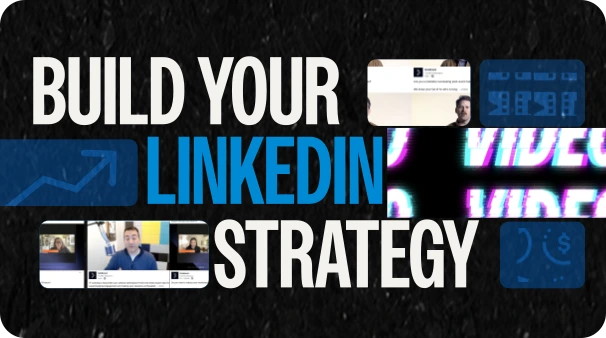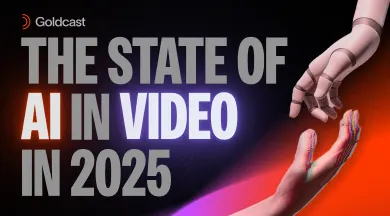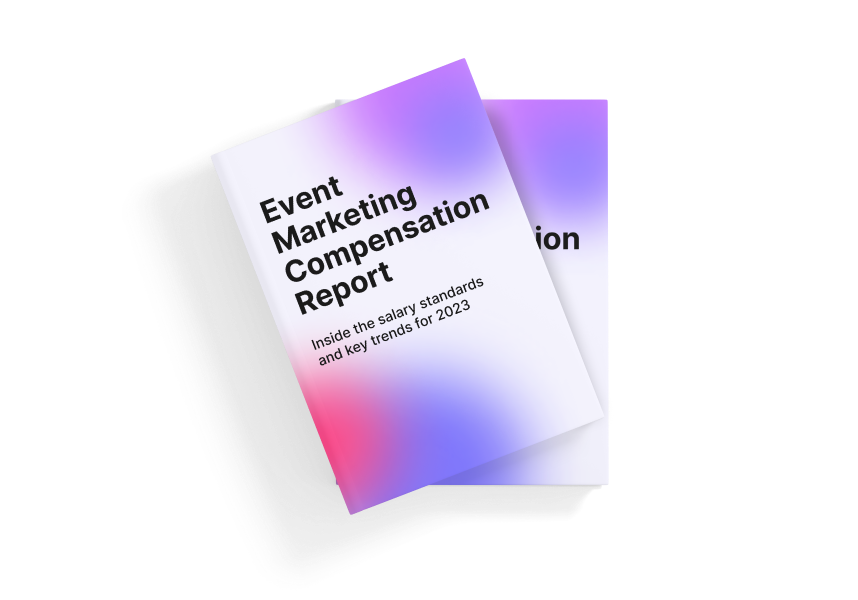Event Marketing Compensation Report
Inside the salary standards and key trends for 2023
It's 2023, which means it's time for our second annual Event Marketing Compensation Report! Our original goal in creating this report was to shed more light on industry standards around pay and compensation. Digital marketing is still a relatively newish career in the grand scheme of things, and information around pay in any industry can be somewhat opaque. We want to change that! At Goldcast, we fully believe knowledge is power. The more marketers know about what's standard in the industry, the more they can assess whether they're being compensated fairly and advocate for themselves.
How To Use This Report
If you saw our report last year, you might notice quite a few things are comparatively stable in this year's report. We think that's a good thing; volatility is definitely not what we want to see when it comes to salary and career growth! As you read, please keep in mind that compensation (and how appropriate it is) depends on a lot of extraneous factors. For example, if you live in a small town and work remotely, your salary is going to go a lot further than the same amount of money in New York City. If you're using this data to create a target for your own salary or to assess whether you should be satisfied with what you're making, be sure to account for any key critical factors like the one we just described. Following that example, if you live somewhere with a low cost of living, perhaps your salary will be a little lower than some of your peers. Or, maybe you have the same manager-level title as another person, but your job is broader in scope, and so you make more. Salary will never be a one-size-fits-all deal. The number that is right for your role will depend on the industry you're in, how experienced you are, where you live, where your company is at growth-wise, and so much more. The goal of reports like this is simply to create some transparency around what people are paid and begin to spark dialogue among professional marketers. A major discrepancy between the numbers you see here and what you make, for example, would probably raise an eyebrow—even with all other things considered.
Here’s what we’ll cover:
Report overview About the report Average event marketing salary Top 7 compensation trends to watch Additional resources
Report overview
Looking for a deeper dive? Watch our on-demand report overview, where we break down the details of this year’s report. Enjoy the full session or use the chapters to skip around!
✨ Want Career Clarity? Watch our Career Workshop with Guided Coaching!
About The Report️
To compile the report, we surveyed 208 marketers across 31 states. The overwhelming majority of respondents self-identified as women (90%), with the remaining 10% being men. Almost all survey participants were based in the United States, with most responses coming in from a handful of U.S. states. We had respondents across all levels of seniority, including associate, manager, director, and vice president. Here’s a quick breakdown of location and company information for survey participants
Respondents by state
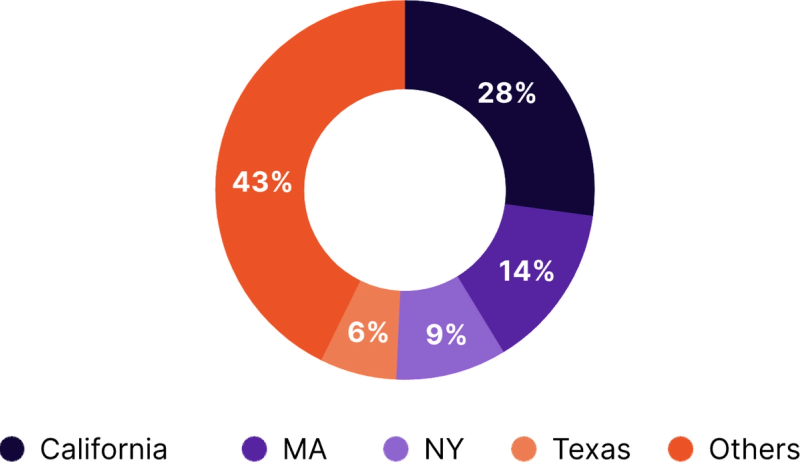
Of the 31 states from which we received responses, there was an emphasis on major event markets: 43% from California, 14% from Massachusetts, and 9% from New York.
Respondents by Company Size

People worked at companies of all sizes. The majority (34% and 33%, respectively) are employed by companies with 100-500 workers and 500-2000 workers—a good indicator that there are many positions for marketers open at small and mid-size companies. Completing the pool were companies with less than 100 employees (17% of respondents), organizations with 2,000-10K employers (11%), and large companies with more than 10K workers (5%).
Respondents By Industry
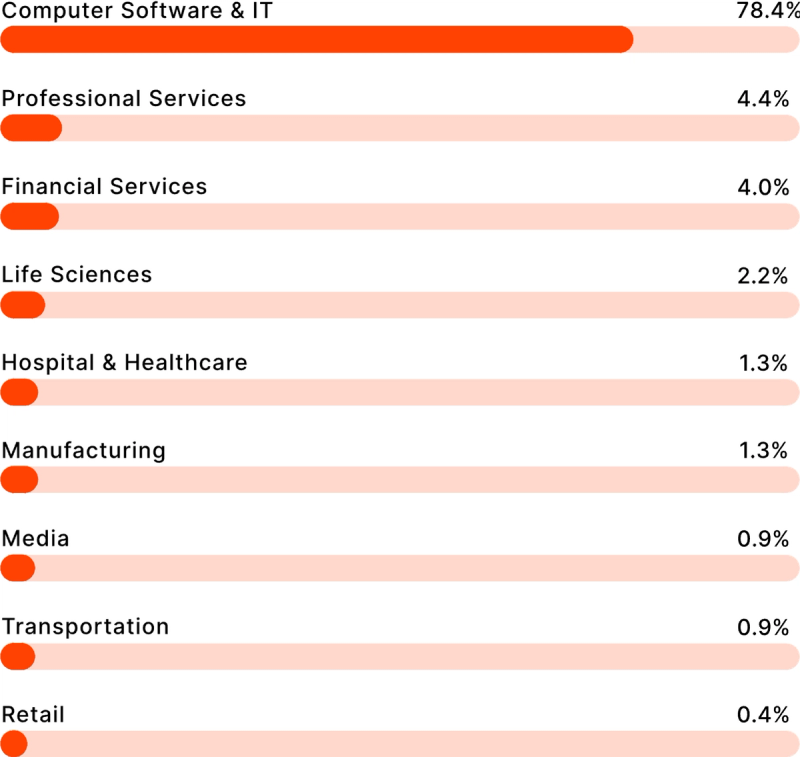
Our respondent pool skewed heavily toward the tech side, with 78.4% of folks working in the Computer Software & IT industries. We also saw a fair amount of people who worked in Professional Services or Financial Services (around 4% each). Beyond that, a smaller number of people identified their industry as:
- Life Sciences
- Hospital & Healthcare
- Manufacturing
- Media
- Transportation
- Retail
Average Event Marketing Salary
This is down very slightly (just half of a percent, or 0.5%) from last year's average of $125,885.
![[object Object]](https://cdn.sanity.io/images/2939l4aj/production/19a40e90b8c21908c49970f9dae29236ef2756ed-1600x456.png?w=800)
Interestingly, though, salaries in each respective market appear to have increased—sometimes pretty significantly!
- California: $147,715 (a 1.15% increase over last year)
- Massachusetts: $136,283 (a 13.28% increase!)
- New York: $134,875 (an 8.08% increase)
It's one thing to look at numbers on paper, but remember that salary is just one data point. To understand what these stats mean in the grander scheme of things, we'll need more contextual insights. (Those are coming next, btw!)
Top 7 Compensation Trends To Watch
Here's what we found to be the overarching event marketer compensation trends in 2023. We dug through all the data to discover seven event marketer compensation statistics you need to know!
1. 54% Of Event Marketers Said They Received Bonus Pay
More than half of marketers shared that they receive bonuses. Some companies award bonuses based on specific KPIs, while others offer stock options or profit shares to employees.
How Bonuses Are Determined
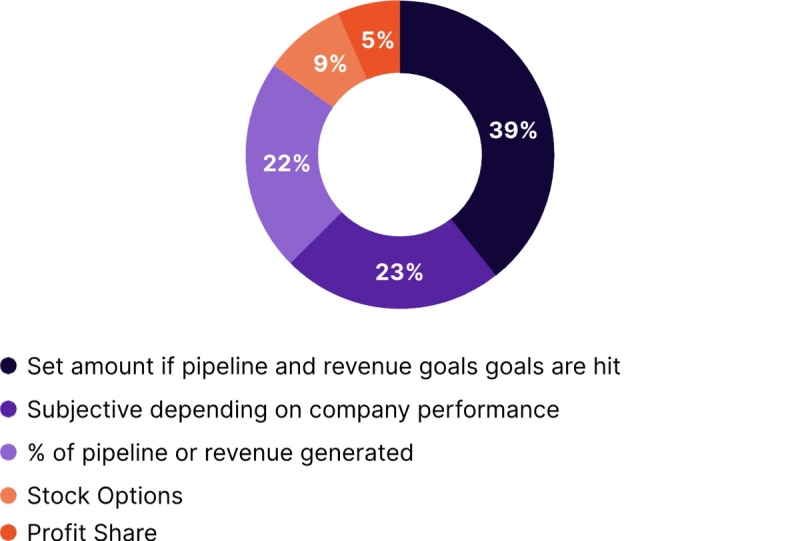
The average bonus clocked in at 11% of the base pay, meaning these bonuses can definitely help boost an employee's bottom lines! There's an important takeaway here. If you're in talks with a company that can't meet your salary request, perhaps you can ask for a bonus to reach your target. That might be a way for you and the company to meet in the middle and help avoid a negotiation stalemate. As you can see above, the options for bonus structure are flexible. You could ask for the bonus to be tied to your department performance, arrange for it to be guaranteed at the end of each fiscal year if the company meets its goals, etc. Essentially, bonuses might be a creative way to up your total compensation while keeping your base in line with what the company is offering.
2. Salary Increases Exponentially With Promotions
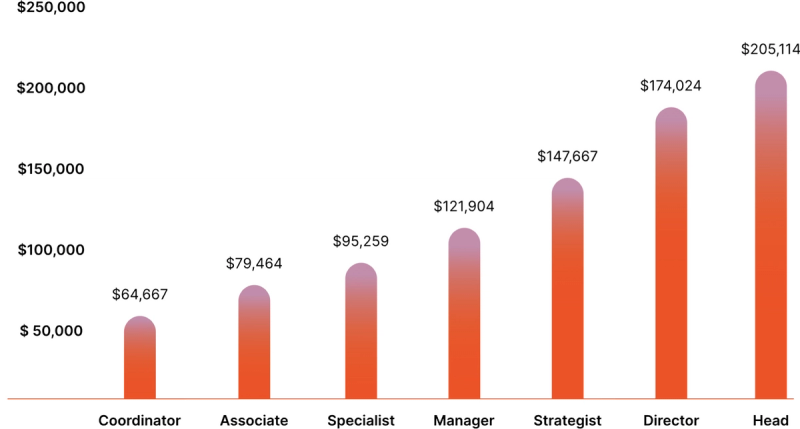
There's no groundbreaking info here: The higher on the career ladder your title falls, the more money you make. The biggest increases happen at the beginning and later in a person's career. Associate to Manager transitions reflect a whopping 53.41% increase in salary, and moving from a director-level position to executive leadership means another near-18% hike in pay.
3. Salary Also Increases With Years Of Experience, But Not As Fast
Salary also increases as you progress in your career—even if you don't change titles. However, the growth isn't as dramatic as we saw with title changes.
Event Marketing Salary By Years Of Experience
![[object Object]](https://cdn.sanity.io/images/2939l4aj/production/9aef4c11faebda75ead57341768e6351cb2cc1aa-1908x1212.png?w=800)
This means that if you want to make more money, the best strategy may be to go after a title change or promotion. As an example, recall that in our last graphic, we saw Director-level positions average $174,024 in annual salary. This isn't too far off from the 17-20 years of experience bracket. However, if you leverage your experience to move from a Director role to a higher-tiered leadership opportunity, you'd be looking at an average salary of $205,114 a year—versus your next hike tied to experience, which would land you around $185,567. In this case, it makes more sense to seek out a promotion instead of waiting to be paid for your years of experience.
A quick caveat: Remember that our major respondent markets have a pretty high cost of living (hello, California!) That will skew the data and may mean that these salaries are higher than you can expect in your city. For example, the 0-4 experience range has an average salary of $88,713. It’s usually very hard to start with that salary early in your career unless you’re based in California or another high cost-of-living market! Other markets reported much lower salaries for entry-level positions.

Since California skews our data here, let’s look at a breakdown of our major markets (California, Massachusetts and New York) against everywhere else. As you can see, California salaries are higher than all other markets, no matter how many years of experience you have. Starting salaries appear to be just slightly higher than markets like NYC or MA, but then the gap continues to grow. We keep saying this, but don't equate that final salary number with how much money you're taking home! While these starting salaries may make you want to move to Los Angeles or Boston, you're also going to spend a lot more money on the same amenities you expect in your current city. That's no small consideration! We recommend using these numbers as starting points. From there, do additional research on what local marketers make in your area. (We've got some handy resources to help you out, coming up soon!)
4. Salary Doesn’t Change Much Based On Company Size
You may be surprised to discover that growth-stage startups and smaller enterprise companies actually pay more than large companies.
Event Marketing Salary By Company Size
![[object Object]](https://cdn.sanity.io/images/2939l4aj/production/f06001a63d1fd6a95e071f2986c5a1958dfdcfe7-1908x1194.png?w=800)
However, bonuses and other benefits likely close this gap. The numbers you see above correlate to base salaries only. Regardless: If you're looking to build your career and feeling hesitant about smaller companies, don't be! This data is an indication that startups and smaller companies are still well-funded and able to offer attractive compensation packages to candidates.
5. It Takes 17-20 Years To Become A VP
We already know title changes offer the most money increases, so you shouldn't be surprised to find that the VPs make the highest salaries here.
Event Marketing Title By Years Of Experience
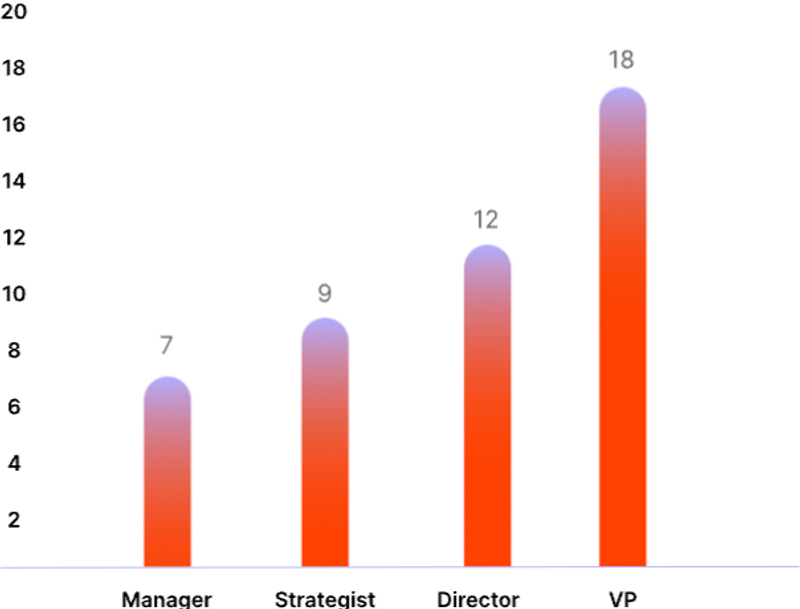
We also looked at the average years of experience most marketers had before they took on each position. The years of experience you see above each title includes only marketing-related roles. So, what did we find? On average, it takes 18 years of marketing experience to land a VP title. The good news? Event marketing is a rapidly emerging field and roles do exist at the VP level. If this is your passion, keep going. There is a seat for you at the executive-level table!
6. There’s A Positive Correlation Between Event Budget And Salary
We saw a correlation between what people made and how much their company allotted for event budgets. The higher the overall event budget, the higher the salaries.
Event Marketing Salary By Event Budget
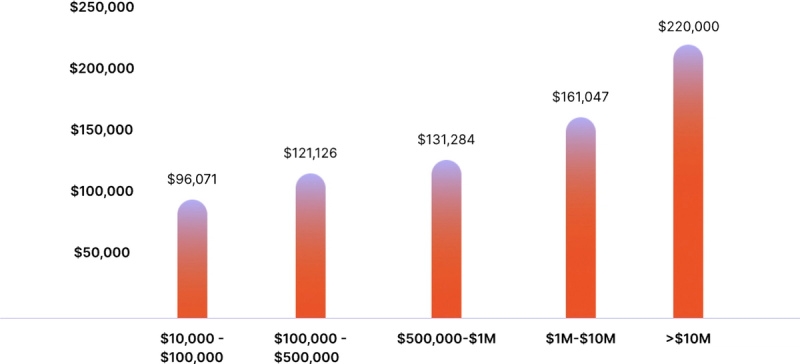
This is a new finding for 2023 and a potentially loose correlation—meaning, there's a lot more that probably goes into this. Specifically, a bigger budget likely means a bigger team overall and a focus on prioritizing events in general. The event marketer who works for that company would make more money than a company that isn't as focused on events. However, the relationship still stands. If you see a company putting a lot of funding behind their events, they may be a lucrative future employer!
7. Event Marketers Received An Array Of Additional Benefits
You're probably well aware that, in terms of compensation, the money deposited into your bank account every two weeks is far from the only thing that matters. People are looking for more holistic, inclusive benefits packages from their employers. Think: WFH ability, flexible health insurance options, stipends to cover coworking spaces, etc.
Event Marketers Report These Additional Benefits
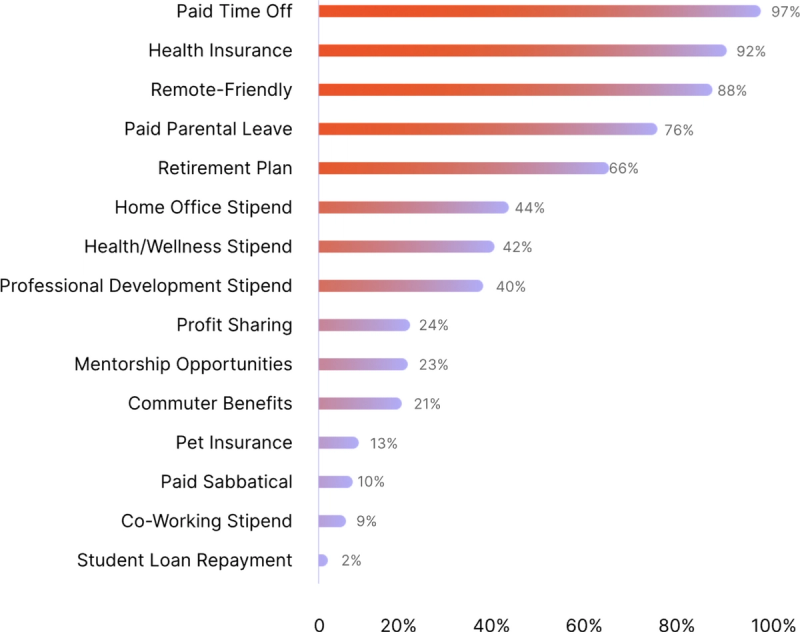
We saw this with respondents, with almost everyone saying they receive PTO to complement their work-life balance. Most companies also offered health insurance, remote-friendly work, paid parental leave, and retirement plans. Some companies took it further and provided stipends to support employees in their wellness or professional development efforts, paid for commuters' expenses, took on pet insurance, and a variety of other benefits. This is another area you may be able to negotiate if a company can't meet your base salary request. While they may not be able to up the dollar amount, perhaps they can give you more paid time off or help you with a benefit that's important to you, like family planning or caregiving support.
Additional Resources
We've uncovered so much valuable data today! We hope you now have a better understanding of what kind of compensation to expect as an event marketer, as well as where your experience can lead you down the line. Be sure to use this info to spark new conversations with your peers and colleagues in the industry! The more people talk about money, the better. And if you're looking for additional resources on Event Marketing compensation and careers, keep scrolling! Here are a few of our favorites.👇
Salary And Compensation Research
This report is a great starting point, but be sure to check other salary sources as well. There are several great databases with vast research on various titles, markets, etc.
☑️ Comparably and Glassdoor are excellent resources for not only salary information, but also additional benefits and company culture. ☑️ Salary.com and Payscale provide large data sets with detailed information on specific titles, years of experience, location, and more. ☑️ LinkedIn, every professional’s favorite social network, offers a handy salary tool paired with a job search feature that lists relevant roles. ☑️ BuiltIn is a wonderful resource for folks in the tech space, particularly in large markets like Atlanta, Boston, Chicago, New York, and many more.
Event Marketing Communities
Are you looking to connect with other event marketers in a friendly, welcoming environment? If so, you’re sure to find your people at these community groups. Check them out!
Event Profs Community
We are the private, online community where event professionals can exchange ideas, ask for help, and connect with other event professionals. Learn More
The Event Marketers Club
The best community for B2B marketers who run events and webinars to drive revenue. Learn More
Goldcast's Event Marketing Blog
Dig into industry news, best practices, and insider tips on how to transform your events into a top revenue-generating channel.
Stay In Touch
Platform
Resources
Company
Community
© 2025 Copyright Goldcast, Inc. All rights reserved.



 Upcoming Events
Upcoming Events Event Series
Event Series On-Demand Events
On-Demand Events